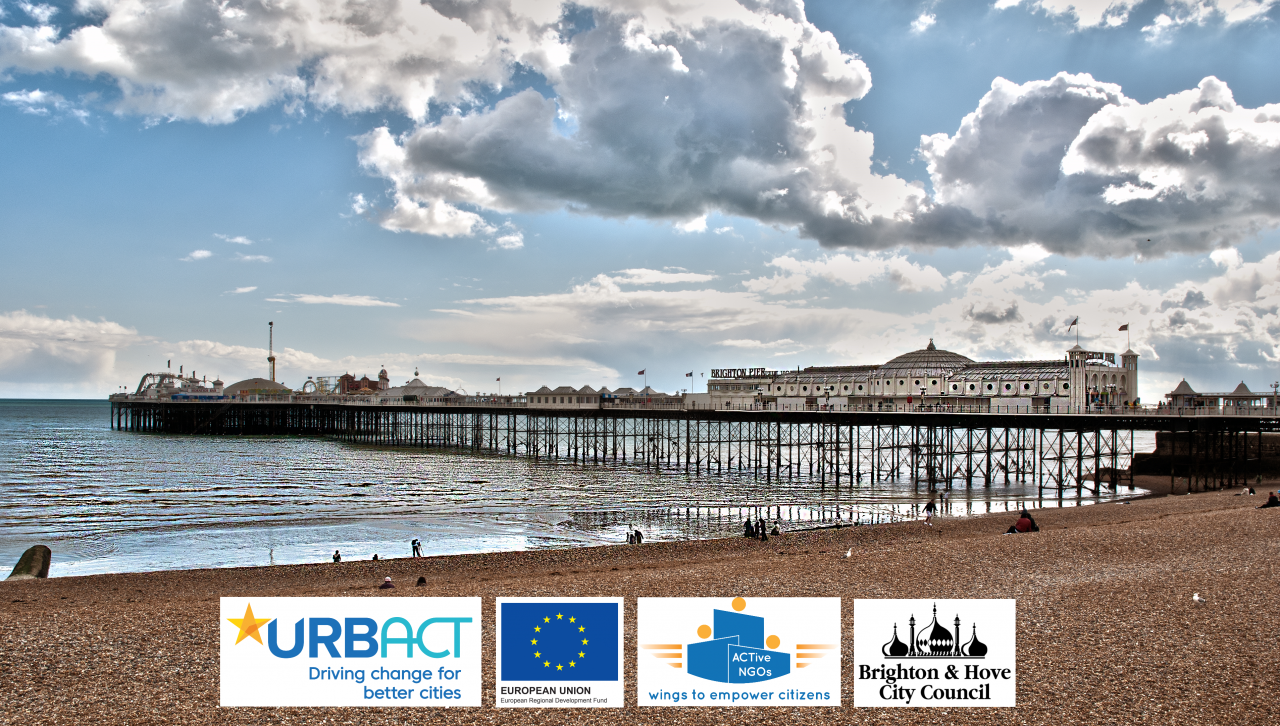
The beginning of April has been marked with a reunion, celebration and a significant review moment for the participants of the URBACT project “Riga NGO House - platform for cooperation between non-governmental organizations and municipalities” (ACTive NGOs). On April 7 and 8, 2021 the project participants and other stakeholders met in a virtual environment during the international final event “ACTive NGOs: creating community spaces for the development of local ecosystems”. The project has come to an end, but the work is still going on and the partners can still continue developing the idea of an NGO House in their cities.
ACTive NGOs is an URBACT Transfer Network which brought together the municipalities of Riga, Brighton and Hove, Dubrovnik, Espoo, Santa Pola and Siracusa, which have all worked hard on creating new platforms for public-civic cooperation in their cities. Participants from project partner cities and other European cities were able to follow the insight into the 3 years of the ACTive NGOs project's good practice transfer network and the trajectory of experience exchange and learning.
The first day of the event was focused on the municipality of Brighton and Hove (UK) and participants learned a lot about civic initiatives, community venues and social inclusion projects in East Brighton. Representatives from Brighton and Hove demonstrated several videos and took the participants on exciting virtual trips. The participants have been warmly welcomed by Gill Williams, Councillor in East Brighton, and Emma McDermott, Head of Community, Equalities and Third Sector at Brighton and Hove City Council.
How far have we got? The answers to this important question about the results were provided by six project partners in interviews, discussions and presentations, outlining the achievements and also future intentions.
Representatives of Brighton and Hove stressed: “The highlight of the project has been the opportunity to learn from European project partners and transfer this learning into the local community. Two key achievements from this knowledge transfer has been the following: the creation of the Hawks Café Youth Project and the opening up of free online courses for the community. The ULG members who visited partner countries were able to learn and share this learning upon their return with the rest of the community”.
Main learning points from Dubrovnik: “Scoping the NGO ecosystem and networking, internal alignment - strengthening the governance modalities of the centers and opening up to the needs of the community. When it comes to the local and national policy changes, the consistent effort of collaboration and building mutual trust between the NGOs and the City of Dubrovnik was very important in further developing the idea of the public-civil partnership and especially the demystifying the concept of participatory governance. It gave all of the actors a confirmation that they are in trend with the similar European practices and put a firm foundation for further opening and developing spaces for NGOs and the local community, as well as a stable network of social-cultural centers dispersed throughout Dubrovnik which was the long-term vision emphasized by the members of the Dubrovnik ULG.”
Representatives from Espoo noted: “The ACTive NGOs project has raised the awareness about the possibilities for working together with NGOs. The municipality workers have stressed that they have learned a lot about the NGOs and the range of activities that NGOs offer. The NGO workers have been pleased to meet city officials face to face. The project has opened eyes and opened doors – also literally.”
City of Riga as the most successful aspects developed in the project highlighted: “New forms for stronger cooperation with Riga`s NGOs, promoting cooperation between NGOs, stronger identification and understanding of local stakeholders, new digital and performance solutions. In general, the achievements of the project are both a good starting point and a reference point for further cooperation between NGOs and the municipality, as well as for the development of the NGO House, as valuable experience and knowledge has been gained in international seminars.”
Santa Pola`s representatives mentioned: “One of the main achievements of the project has been the contribution to improvement of knowledge about NGOs activity through updating the local database of associations, a task that has been launched within the “ACTive NGOs” and that will continue in the long term. This database constitutes a key element in the development of local policies to support associations. Another significant achievement of the project have been the consolidation of new dynamics of collaborative work between local administration and associations, improved visibility of local associations and improvement of the management instruments of associative spaces.”
Insights from Siracusa: “The administration of Siracusa has certainly understood, more and more, the importance of collaborating with the Third Sector, which represents a precious resource for the city, not only during emergencies. While the associations have discovered the importance of networking and sharing spaces, needs, resources and “dreams”.”
During the event, the project's Lead Expert Levente Polyak presented the upcoming book “The power of civic ecosystems. How community spaces and their networks make our cities more cooperative, fair and resilient”, sharing a number of examples from both ACTive NGOs cities and other European cities.
The second day focused on the impact of the project in the partner cities, sustainability and planning of future activities. In order to promote the development of the aspects achieved in the project, the invited experts - service design expert Liat Rogel and communication expert Simone d`Antonio - led two practical and exploratory workshops for the participants. Their main task was to look back at the project and think about the future - what values to keep.
The project is coming to an end, but during the final event we could clearly see that all partners have learned a lot and there is a good potential of continuation of sharing of Riga good practice in all partner cities and beyond.

